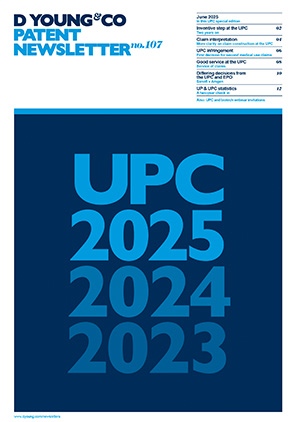UK Supreme Court rules only people can be named as inventors
On 20 December 2023, the UK Supreme Court handed down its judgment in the case of Thaler v Comptroller-General of Patents, Designs and Trademarks, unanimously ruling that only a natural person can be named as an inventor on a patent application, upholding the decisions of the lower courts.
The case concerns two patent applications for inventions the appellant, Dr Thaler, stated were created by an artificial intelligence (AI) machine known as DABUS. The patent applications were taken to be withdrawn by the UK Intellectual Property Office (UKIPO) for failure to correctly designate the inventor of the applications. Dr Thaler had indicated DABUS to be the inventor and that he had the right to grant of the patents by virtue of ownership of DABUS.
In the decision, Lord Kitchin set out the following three issues:
- The scope and meaning of “inventor”.
- Was Dr Thaler the owner of any invention in any technical advance made by DABUS and entitled to apply for and obtain a patent in respect of it?
- Was the hearing officer entitled to hold that the applications would be taken to be withdrawn?
The decision sets out that the “inventor” in relation to an invention means the actual deviser of the invention and there is no suggestion that “deviser” has anything other than its ordinary meaning that is, a person, in the Patents Act. Lord Kitchin reiterated the inventor must be a natural person and that Section 7(3) of the Patents Act provides an exhaustive code for deciding who is entitled to the grant of a patent. He also observed there is a consistent presumption in the Patents Act that the inventor is a person with legal personality, such as the sections on prior disclosures and entitlement. It was therefore decided DABUS is not and was not an inventor of the applications in question; Lord Kitchin acknowledging this alone was fatal to the applications.
Lord Kitchin then set out two difficulties with the presumption that Dr Thaler was the owner of the applications:
- DABUS is a machine with no legal personality and therefore is not an inventor; and
- Dr Thaler has no independent right to a patent in respect of a technical advance developed by DABUS.
Lord Kitchin stated the Patents Act does not confer the right to obtain a patent for a product or process generated autonomously by a machine, let alone a person who claims that right purely on the basis of ownership of the machine. He also disagreed with Dr Thaler’s arguments by analogy to the doctrine of accession, in particular that a patent is a tangible property such that title can pass to the owner of the machine, stating there is no principled basis for applying the doctrine of accession in the circumstances of the case. It was therefore decided Dr Thaler never had any right to secure the grant of the patents to himself.
In Lord Kitchin’s view, the hearing officer was plainly entitled to hold the applications to be taken to be withdrawn. Although he acknowledged it is not the UKIPO’s function to examine the correctness of statements of inventorship, he held that Dr Thaler failed to identify a person who was the inventor, disagreeing with LJ Birss in the Court of Appeal decision who considered “no person” to be a complete and satisfactory response.
The Supreme Court did, however, acknowledge were Dr Thaler the inventor and used DABUS as a tool to generate the inventions, the outcomes of the proceedings would have been different; indeed, both applications were considered novel and inventive by the UKIPO.
The decision also reiterated that this appeal was not concerned with whether technical advances generated by an AI machine should be patentable or whether the meaning of the term “inventor” should be expanded; those are both policy issues to be decided by the UKIPO and UK Government. Lord Kitchin did note, however, that the rapid advances in AI technology render these questions even more important than when the applications in question were filed.
In this regard, on 15 December 2023, the High Court granted the UKIPO leave to appeal the decision of Emotional Perception AI Ltd v Comptroller-General of Patents, Designs and Trade Marks [2023] EWHC 2948 (Ch) to the Court of Appeal, where the High Court found that the UKIPO had erred in finding a neural network implementing a recommendation system as being excluded from patentability. We therefore await the next chapter in this quickly evolving legal landscape.
Related article
See our article "UK High Court overrules UKIPO to find AI inventions patentable" published 24 November 2023.
Read moreCase details at a glance
Jurisdiction: UK
Decision level: Supreme Court
Parties: Stephen L Thaler (Appellant, Comptroller-General of Patents, Designs and Trade Marks (Respondent) and CIPA (Intervener)
Citation: [2023] UKSC 49
Date: 20 December 2023

